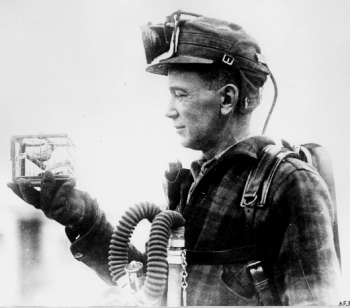Last night I came across the following quote:
"The Arctic is often cited as the canary in the coal mine for climate warming," said [NASA climate scientist Jay Zwally], who as a teenager hauled coal. "Now as a sign of climate warming, the canary has died. It is time to start getting out of the coal mines." link and link
It's a startling image -- there's something in the coupling of the huge icebergs with the tiny birds. The friendship -- the death -- the alarms.

link
So I started a little mining project of my own. Lonnie Thompson, a renowned scientist specializing in high-altitude ice, might have coined the phrase in a 2004 interview with National Geographic.
Glaciers serve as the canaries in the coal mine. I grew up in West Virginia, where coal mining was an important part of the state's economy. Coal miners would take canaries down in a cage. If the canary died, they would get out of the mine, because it meant methane gas was building up in the system. link
He said he thought the glaciers could be gone by 2020. It's a great article, and one of the few I've read that gives credit to the resiliency and drive of humans when forced to change.
Back to this canary image, though -- as poets, we become adept at listening to the little nagging voices in the back of our heads that say, something is a little off here. Something in this vehicle of communication is not translating for me.
Coal miners have been phasing out canaries for the last 20 years in favor of the more humane electric robot version. Miners were said to be sad at the loss of life with them -- the whistling, the singing, the companionship.
A glacier is huge and cold. It is not something that sings to us while we do the difficult work of living -- however beautiful. Mostly, though, we have not taken it with us as an alarm. It was here before us. It symbolizes more, perhaps, life before us.
Then I came across another article, still on National Geographic:
Asthma is increasing among Americans of all incomes and races. But inner-city children are truly the canaries in the coal mine for this disease, aggravated by emissions from the combustion of coal, gasoline and diesel fuels, among other factors (see below). I'd dread the summer a lot less if I didn't live in New York City, which has the country's highest asthma mortality rate. So would the residents of Harlem, Williamsburg and the South Bronx -- low-income, minority communities with the highest asthma death rates in this city. link
It's not that I am not alarmed by the glaciers... but children win. Children and the fact that these people are small and defenseless, so more apt to conform to the metaphor. Furthermore it is clear again and again that while the long term outcome of our state of affairs absolutely effects us all, the people suffering most until we are forced to change are not the people with the money and the power -- not in Nigeria, not in New York.








No comments:
Post a Comment